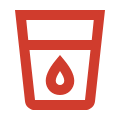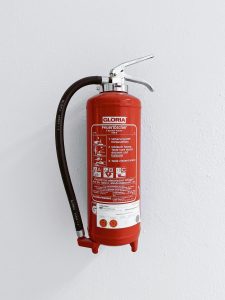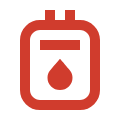7.3 Meeting Legislative Requirements via Inspections and Processes
This section provides an overview of a few of the basic processes required by legislation that influence food services.
Booking a Water Test
Ontario Drinking Water Quality Standards
 Legislation requires drinking water systems providing potable water to the public to undergo inspection and take measures that lower the risk of hazards to human health. Potable water is water that meets a specific quality standard that is considered safe for human consumption. Any water that is used in food preparation and production must be potable water.
Legislation requires drinking water systems providing potable water to the public to undergo inspection and take measures that lower the risk of hazards to human health. Potable water is water that meets a specific quality standard that is considered safe for human consumption. Any water that is used in food preparation and production must be potable water.
A water test will confirm that the facility has potable water for use in food preparation and production. Contact the local municipal public health unit to book a water test.
Booking a Fire Safety Inspection
Fire safety legislation and Ontario’s Fire Code
 Municipalities fund and operate fire departments. Fire departments are responsible for fire education and fire safety in the municipality. This includes fire inspections for residential buildings. Management should work in collaboration with the local fire department on fire prevention, education, and training drills at the facility. Contact the local municipal fire department to book a fire safety inspection.
Municipalities fund and operate fire departments. Fire departments are responsible for fire education and fire safety in the municipality. This includes fire inspections for residential buildings. Management should work in collaboration with the local fire department on fire prevention, education, and training drills at the facility. Contact the local municipal fire department to book a fire safety inspection.
Types of Fire Extinguishers

| Class | Description for Use |
|---|---|
| A | Fires in ordinary combustible materials, such as wood, cloth, paper, rubber, and many plastics |
| B | Fires in flammable liquids, combustible liquids, petroleum greases, tars, oils, oil-based paints, solvents, lacquers, alcohols, and flammable gases |
| C | Fires that involve energized electrical equipment |
| D | Fires in combustible metals, such as magnesium, titanium, zirconium, sodium, lithium, and potassium |
| K | Fires in cooking appliances that involve combustible cooking media (vegetable and or animal oils and fats) |
Kitchens require class K fire extinguishers.
Booking a Gas Inspection
 A licensed gas fitter is required to complete an inspection of gas appliances. A gas fitter is trained and regulated by the Technical Standards and Safety Authority (TSSA) to provide safe oversight of the use of natural gas, propane, and liquid fuels. Inspections must be scheduled via a licensed gas fitter.
A licensed gas fitter is required to complete an inspection of gas appliances. A gas fitter is trained and regulated by the Technical Standards and Safety Authority (TSSA) to provide safe oversight of the use of natural gas, propane, and liquid fuels. Inspections must be scheduled via a licensed gas fitter.
Managing Waste Collection
 Waste collection involves contracting a company to remove waste, garbage, compost, and recycling from the property on a weekly or bi-weekly basis. The first step in the process is to engage a company by way of a Request for Proposal (RFP), which is used by companies to solicit quotes for service. The next step is collaboration between your company and the waste management company to determine sorting practices and pick-up dates. Often, the environmental services manager or maintenance department will procure the contract with the waste management company and the Nutrition and Food Service manager will only be responsible for educating and training staff on the sorting and binning of the wastes.
Waste collection involves contracting a company to remove waste, garbage, compost, and recycling from the property on a weekly or bi-weekly basis. The first step in the process is to engage a company by way of a Request for Proposal (RFP), which is used by companies to solicit quotes for service. The next step is collaboration between your company and the waste management company to determine sorting practices and pick-up dates. Often, the environmental services manager or maintenance department will procure the contract with the waste management company and the Nutrition and Food Service manager will only be responsible for educating and training staff on the sorting and binning of the wastes.

